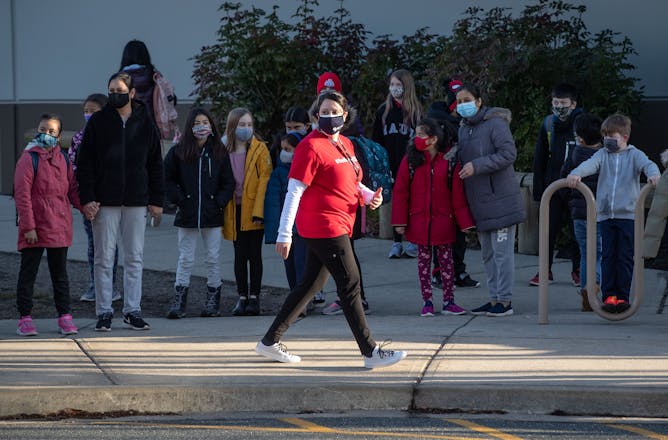|
|
|
|
It’s not easy to be a substitute teacher. One is thrown in with minimal notice to be an attentive presence responsible for some 30-odd young people of varying, and often underserved, needs. It’s a job that in some cases has been taken by teachers at the early and later stages of their careers: new teachers looking for permanent jobs, or retired teachers with the experience under their belts who don’t mind an odd work day now and then and the extra income. But that’s changed with COVID-19.
Today in The Conversation Canada, Nathalie Reid and Jerome Cranston at the University of Regina write that COVID-19 has made existing teacher shortages even worse. They say if full-time teachers who are emotionally exhausted depart in the fall, and “there is an inadequate supply of new teachers or substitute teachers to mitigate what could easily be a higher than usual attrition rate, student learning will suffer.”
Also today:
Regards,
|
Susannah Schmidt
Education + Arts Editor
|

|
|

Students watch as a teacher participates in a solidarity march with colleagues to raise awareness about COVID-19 cases at École Woodward Hill Elementary School, in Surrey, B.C., Feb. 23, 2021.
THE CANADIAN PRESS/Darryl Dyck
Nathalie Reid, University of Regina; Jerome Cranston, University of Regina
Provinces have struggled to mitigate the COVID-19 health concerns of full-time and substitute teachers. The need for substitutes has increased, but fewer are available.
|

Canada is poised to pass laws aimed at social media companies and harmful online content. Is it the right approach?
(AP Photos)
Vivek Krishnamurthy, L’Université d’Ottawa/University of Ottawa
Canada needs to think carefully about our approach to regulating online harm. Rather than going it alone and taking aim at social media companies, Canada should work with other democracies.
|

Ambulances waiting outside the emergency room at St. Paul’s Hospital in downtown Vancouver, where an outbreak of Shigellosis is affecting marginalized people.
(Ben Huang)
Ben Huang, University of British Columbia
Infectious dysentery, usually found in developing countries with poor living conditions, is turning up in Vancouver's most marginalized neighbourhood.
|

At first glance, these programs might seem attractive. But they suffer from fundamental flaws.
(Shutterstock)
Joven Narwal, University of British Columbia
There is a growing trend to import another Americanism into the Canadian anti-money laundering strategy: a whistleblower incentive program that would amount to bounty hunting for violations.
|

Google’s new advertising claims to preserve user privacy, but it still gathers and processes the details of our online activities.
(Shutterstock)
David Murakami Wood, Queen's University, Ontario; David Eliot, Queen's University, Ontario
Google is using artificial intelligence to collect and process user data in a way that produces more nuanced and detailed information about our activities but addresses privacy concerns.
|
La Conversation Canada
|

L’avenir du travail automatisé ne signera pas forcément la fin des emplois pour les humains.
Shutterstock
Joshua A. Marshall, Queen's University, Ontario
L’utilisation de robots et de machines autonomes augmente dans tous les secteurs industriels, forçant les gouvernements à mettre en place une stratégie pour la main-d’œuvre.
|
Arts
|
-
Diletta De Cristofaro, Northumbria University, Newcastle
Published in 1991, the tale of over-educated, under-employed young people who lament the broken world they've inherited speaks to the concerns of today's youth.
|
|
Environment + Energy
|
-
Arya Assadi Langroudi, University of East London
For every 0.1℃ rise in temperature, the number of sinkholes increases by 1 to 3%.
|
|
Politics
|
-
Matthew Valasik, Louisiana State University ; Shannon Reid, University of North Carolina – Charlotte
New members are joining and some are leaving – as right-wing groups reorganize, scholars of the movement foresee increased polarization, with a risk of more violence.
|
|
| |
| |
| |
| |

|
| |
| |
| |
| |
| |
| |
| |
| |
|
|
|
|
|
|
|